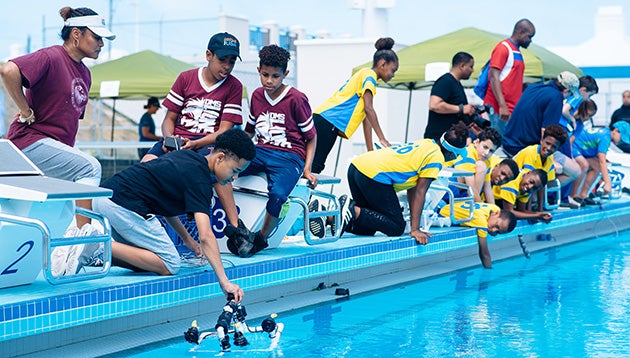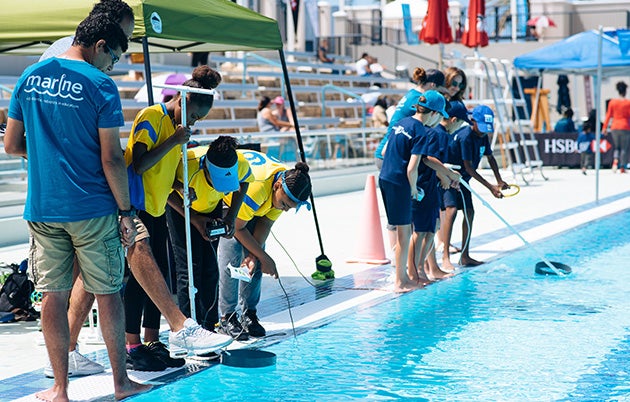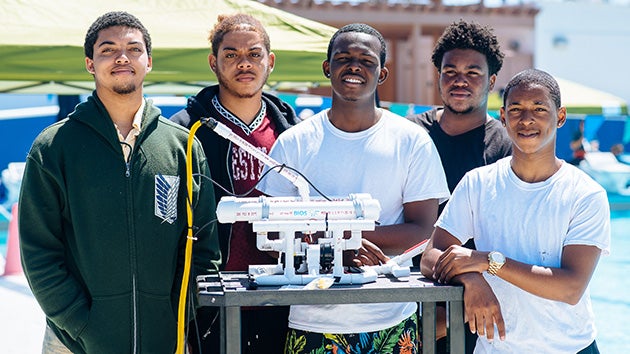They Came. They Saw. They Brought Robots.

The “Dellwood Dabsters 2” from Dellwood Middle School (pictured on left) test and refine their ROV before beginning the competition. Successfully completing the missions requires coordination and communication among team members, each of whom has a separate responsibility, such as driving the ROV through the obstacle, managing the vehicle’s cables, and assisting with the viewing pole, which helps students see their robot as it works below the surface. Practicing before the competition, as well as between turns, gives the teams an opportunity to adjust any issues and receive feedback from their coach. Photo by Alex Masters.
The pool at the National Sports Centre hosts numerous aquatic competitions throughout the year, but perhaps none as unique as the MATE Bermuda Regional Challenge. The annual challenge, organized by BIOS’s Ocean Academy and supported by lead donor HSBC, is the culmination of months of work by teams of students on the design, construction, and operation of remotely operated vehicles, or ROVs. The challenge is also the final event in the BIOS Mid-Atlantic Robotics IN Education (MARINE) program, which uses a focus on marine robotics to bring science and technology curricula into classrooms around the island.
This year’s contest, held on April 22, saw 19 teams from 10 schools competing in three levels, including the new “Beginner” category. As a regional component of the larger Marine Advanced Technology Education (MATE) Center ROV Competition, the MARINE event is one of dozens of similarly designed challenges held across the U.S. and around the world.

The team “KNZL Co.” from Clearwater Middle School (on left) navigates its ROV through an underwater mission while the “Sea Rangers” from Warwick Academy practice for their turn. This year’s theme for the Beginner category focused on navigation through a simulaiton of Harrington Sound. The challenge course is modeled to simulate challenges and problems that might confront ROVs and their pilots. The “Sea Rangers” went on to win second place overall in the Beginner Primary category. Photo by Alex Masters.
Each year, participants are judged by how they use their ROVs to demonstrate specific skills and maneuvers in the pool. This year’s theme, “Port Cities of the Future: Commerce, Entertainment, Health, and Safety,” highlighted the role that engineers and ROVs play in the maintenance and operation of busy seaports around the world.
“The theme encouraged students to think critically and put their engineering and design skills to the test,” said Kaitlin Noyes, Ocean Academy director and coordinator of the MARINE event. “Events like this show students that what they learn in school, particularly in science, technology, engineering, and mathematics—the STEM subjects—is applicable to everyday life.”
Over the course of the competition, each team had two opportunities to navigate their ROVs through four missions designed to simulate real-world challenges and problems. The teams assisted with the installation of a system to deliver construction materials; conducted maintenance on a water and light array; collected samples of sediment; and located and identified containers that fell from a cargo ship.
Rachel Parsons, a BIOS scientist who served as a judge for two teams in the challenge, was impressed by the enthusiasm and generosity of the students. “Even though they were competitors, I saw a larger team offer up one of its members to a smaller, two-person, team,” she said. With this extra person, the team was able to focus on piloting their ROV and managing the vehicle’s cables, which gave them a better chance at completing the assigned tasks.
In addition to completing the underwater missions, teams prepared a display to market their ROV and completed an in-depth interview about the technical and engineering aspects of their vehicle.
Taking top honors for the third year in a row, in both the Scout (entry level) and the Ranger (mid-level) categories, was Clearwater Middle School. The Ranger team, “CW-ROV, Inc.,” and the Scout team, “CW Gulfstream Ltd.,” were both mentored by a group of three Clearwater staff: Wilbur Lowe, a design and technology teacher; John Madiro, a math teacher; and Katyna Rabain, an information and communication technologies teacher.
Meanwhile, in the Beginner category, Somerset Primary’s “Explorer Bees” took top honors in the primary grades group, while Dellwood Middle School’s “Dellwood Dabsters 2” took top place in the middle grades group. The Dellwood Middle School “Dellwood Dabsters 1” were winners of best marketing poster and the Bermuda College/Cedarbride Academy “Quantum Robotics” team won for best interview.

The “Quantum Robotics” team from Cedarbridge Academy won the prize for Best Overall Interview. During the competition teams were questioned by a panel of judges on a range of topics, from the design and construction of their ROV to the challenges of working together as a team. Tony D’Aoust, a BIOS crewmember on the research vessel Atlantic Explorer and one of the interview judges, recalled the team’s success in thinking through various design ideas and understanding how the different components of their vehicle should work. “Their team spirit and enthusiasm for their project were their most memorable traits,” he said. Photo by Alex Masters.
Tamara Adderley, coach of both teams from Dellwood Middle School, was thrilled with her students’ success in their first ROV contest. “The students were excited when they realized they would be building an ROV from scratch,” she said. “It didn’t take long before they were researching designs, measuring and cutting PVC pipes, and building their control boxes. They can attribute their success to using effective teamwork skills and communication skills they developed throughout the experience.”
BIOS would like to thank the event volunteers, including more than a dozen BIOS faculty and staff, who assisted in the success of the event, as well as the parents and mentors of participants for their ongoing support. Special thanks also goes out to the Orange Bay Company for sponsoring a pizza lunch for all participants, mentors, and event volunteers.
